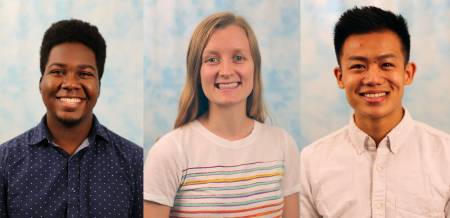Robotics Institute PhD students, Keene Chin, Victoria Dean and Jason Zhang, are amongst the 2020 National Science Foundation’s Graduate Research Fellowship Program Recipients. The NSF GRFP recognizes and supports outstanding graduate students in NSF-supported STEM disciplines who are pursuing research-based master’s and doctoral degrees.
Keene Chin is a PhD student in the Robotics Institute, working with professor Carmel Majidi on the development of soft and inexpensive robotics. Focusing on the socioeconomic impact of robotic technologies, Keene’s work focuses on enabling low resource fabrication of robotic systems, as well as advancing the control and sensing of such systems. A foundational pillar of his research interests is the belief that synthesizing knowledge from multiple fields, especially biology and materials science, is instrumental in exploring the solution space of robotic architectures. This exploration is a necessary step in the democratization of technology beyond the resource-hungry strategies of the last generation of robotic innovation and has motivated Keene’s work in developing lightweight, bioinspired manipulators.
Beyond his academic work, Keene has serves the student community of CMU in multiple capacities: as a Graduate Student Assembly representative for the RI, as one of the leaders of the Robotics Institute student organization (RoboOrg), and as a member of the School of Computer Science Dean’s PhD Advisory Committee. Keene received his undergraduate degree in mechanical engineering from the University of Texas at Dallas, advised by Dr. Ann Majewicz, and Dr. Rodrigo Bernal.
Victoria Dean is a second-year PhD student in the Robotics Institute working with professor Abhinav Gupta. Inspired by child development, she aims to create robots that can act and learn as babies do. To this end, she develops self-supervised robot learning methods that make use of multiple modalities. Multimodality is a basic facet of our world, in which senses like vision, audio, and tactile provide complementary information generated by the same physical processes. Her research focuses on the hypothesis that learning methods will be more efficient if they are built with the use of multimodality in mind, rather than developing methods in single-modality settings where all inputs are treated identically.
In addition to research, she leads Diversity, Equity, and Inclusion efforts through the CMU AI mentorship program and the School of Computer Science Dean’s PhD Advisory Committee. Before graduate school, she studied computer science at MIT and worked on machine learning applications in autonomous driving, computational biology, and computer vision.
Jason Y. Zhang is a PhD student in the Robotics Institute, advised by Professor Deva Ramanan. He is interested in the self-supervised learning of object affordances from unlabeled video by understanding human behavior. His research in Human-Robot Interaction has explored understanding human intention with limited robot interaction, and his research in 3D computer vision has focused on human mesh reconstruction from video to forecast motion and predict intention. More recently, he has been working on truly in-the-wild 3D reconstructions of people and objects in outdoor scenes with no supervision. Jason completed his undergraduate degree in computer science at UC Berkeley where he was advised by Professors Anca Dragan, Angjoo Kanazawa, and Jitendra Malik.
